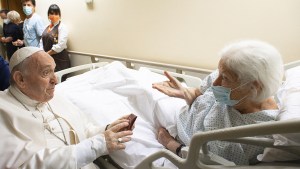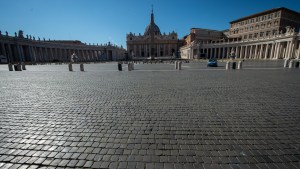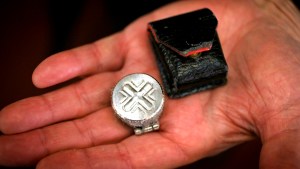Among the seven sacraments of the Catholic Church, one is destined in a special way for those experiencing grave illness or at the point of death: Anointing of the Sick.
During his earthly life, Jesus performed many miracles of healing.
Not only that; He also forgave sins: He came to heal the entire human person, body and soul.
The physical healings were signs of a more radical healing: victory over sin and death, through His cross and resurrection.
Since then, suffering and illness have taken on new meaning. They’ve become instruments of unity with Him and of collaboration in His work of redemption.
In my flesh I am completing
what is lacking in Christ’s afflictions
for the sake of his body, that is, the Church.
Colossians 1:24
Jesus taught His apostles His preference and care for the sick and suffering and made them participants in His healing mission.
Cure the sick, raise the dead,
cleanse the lepers, cast out demons.
Matthew 10:8
The Church continues Jesus’ mission, whether through providing care or through intercessory prayer and the sacrament of Anointing of the Sick.
A rite
Right from its origins there are testimonies of a specific rite for the sick.
Are any among you sick? They should call for the elders of the church
and have them pray over them, anointing them with oil in the name of the Lord.
James 5:14
Even today, the Church celebrates Anointing of the Sick in a similar way.
Only a priest can administer this sacrament: He lays his hands on the sick person in danger of death, prays over him, and anoints him on the forehead and hands with blessed oil.
During the course of the same illness the sacrament can be repeated if the illness becomes worse. If the sick person gets better, they can receive this sacrament again in the case of another grave illness.
The essential condition for receiving this sacrament is to be in danger of death; that includes, for example, before a risky operation.
It’s not necessary to be at the point of death: the Church recommends receiving this sacrament possibly when the person is still of sound mind and with some hope of surviving to be able to participate more fully in its benefits.
Strength to fight Satan
In this sacrament, the Spirit gives comfort, peace, and courage to face the last stretch of life. It renews our faith and strengthens us against the devil’s temptations, such as discouragement and anguish in the face of death.
The sick person receives the strength to unite himself to Christ’s passion and to offer his sufferings for the good of God’s people: the Church intercedes for the sick person and the sufferer contributes to the sanctification of the Church.
Unconscious?
If the sick person is not fully conscious it’s possible to administer the sacrament if the person “does not knowingly reject” the gift of grace. It’s the same as what happens with the baptism of children.
After Baptism and Confirmation, Anointing of the Sick is the last anointing of our Christian life and it prepares us to face the last battle before entering the Father’s House.
Also for this reason, the Church offers those who are about to leave this life the Eucharist, as viaticum for eternal life.
What the Church proposes isn’t a magical healing rite but the comfort and certainty of Christ’s closeness:
In times of pain and illness it is always good to know that we are not alone: the Lord Jesus Himself makes Himself present in the Sacrament, who takes us by the hand, who caresses us and who reminds us that we already belong to Him and that nothing—not even death— can ever separate us from Him.
Pope Francis





